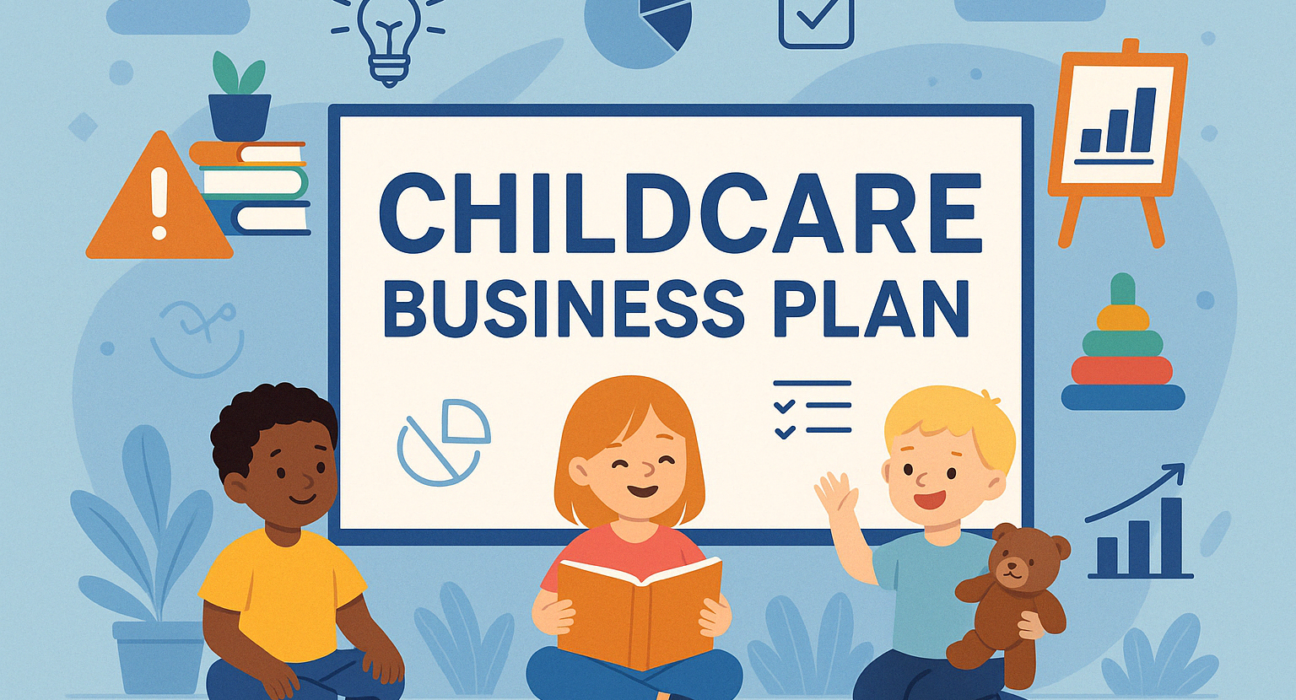Childcare Business Plan: Your Ultimate Guide to Starting a Successful Daycare

In today’s fast-paced world, where parents juggle demanding work schedules and family life, quality childcare is more than a convenience it’s a necessity. If you’re passionate about working with children and ready to turn that passion into a profitable business, crafting a comprehensive childcare business plan is your first critical step.
A strong childcare business plan is not just a formal document; it’s your business blueprint. It helps you define your mission, organize your operations, secure funding, and navigate the competitive childcare industry with confidence.
At How Upscale, you’ll get a complete breakdown of how to create a detailed, actionable, and investment-worthy childcare business plan that will set your daycare up for long-term success.
Why You Need a Childcare Business Plan?
A well-structured childcare business plan does more than just impress banks and investors. It’s your roadmap to launch, scale, and sustain your daycare center. Whether you’re starting a home-based daycare or a fully-staffed childcare center, a solid business plan will:
- Help you identify your market and target audience
- Establish a clear value proposition
- Lay out your operational and staffing needs
- Forecast your financials and break-even point
- Ensure compliance with local and state regulations
If you want your business to be taken seriously, having a childcare business plan is non-negotiable.
Executive Summary: Set the Stage
The executive summary is the first section of your childcare business plan—and often the last to be written. Think of it as your business’s elevator pitch, summarizing all the key elements in one compelling paragraph.
What to Include:
- Business name and location
- Business model (home-based, center-based, franchise)
- Mission statement
- Services offered (infant care, preschool, after-school programs)
- Overview of your goals and projected revenue
Example:
“Little Explorers is a center-based childcare facility located in Pune, India, offering full-day care, early education, and enrichment programs for children aged 6 months to 5 years. Our goal is to create a nurturing, educational environment where children thrive while providing peace of mind to working parents. We project ₹60 lakhs in revenue in our first operational year.”
Business Description: Your ‘Why’
In this section of your childcare business plan, elaborate on what inspired you to start a daycare and what makes your offering unique in the market.
Include:
- Your professional background in education or childcare
- The business structure (proprietorship, partnership, LLP)
- Your daycare philosophy (Montessori, Reggio Emilia, play-based)
- Short and long-term business goals
Make your passion and purpose shine through this section of your childcare business plan. Investors fund people as much as they fund businesses.
Market Research: Know Your Audience
Understanding your target market and competitors is crucial for success. This section of your childcare business plan should demonstrate that you’ve done your homework.
Breakdown:
- Target Audience: Working parents, single-parent families, high-income households
- Demographics: Age group of children, income level, education of parents
- Location Analysis: Urban/suburban area, foot traffic, access to public transport
- Competitor Analysis: Strengths and gaps of other daycares in your vicinity
- Market Trends: Rising demand for flexible hours, tech-integrated learning, safety-focused facilities
Use real stats like “The Indian daycare market is expected to grow at a CAGR of 11% by 2026” to validate your assumptions.
Services Offered: What’s on the Table?
Detail your service offerings clearly. This is a vital part of your childcare business plan as it shows how you plan to meet the diverse needs of parents and children.
Typical Services:
- Full-day and half-day programs
- Infant and toddler care
- Preschool/pre-K education
- After-school programs
- Weekend babysitting
- Enrichment classes (yoga, music, arts & crafts)
- Special needs support
Also mention:
- Age groups catered
- Staff-child ratios
- Language of instruction
- Unique services like live CCTV access for parents or healthy organic meals
Your services should solve problems and offer convenience, and this should be clear in your childcare business plan.
Legal and Licensing Requirements
Any responsible childcare business plan should show a clear understanding of licensing and compliance requirements.
Include:
- FSSAI license for food if meals are provided
- Fire and safety NOC
- Health and sanitation certification
- Local municipal registration
- Childcare license from the relevant education board or government agency
Mention your timeline and steps to ensure compliance, which helps build credibility and investor trust.
Location & Facility Overview
In this section of your childcare business plan, describe your physical setup. Whether it’s a home daycare or a rented space in a commercial building, detail how your location will support child safety, learning, and comfort.
Include:
- Size of facility (e.g., 1500 sq. ft)
- Number of classrooms
- Outdoor play area description
- Safety features: CCTV, fire exits, child-proof furniture
- Sanitation and hygiene arrangements
- Ambiance and interior design philosophy
Consider adding a floor plan or photos to visualize the layout for investors.
Staffing & Management Plan
Quality staff can make or break your childcare service. Your childcare business plan should outline your hiring strategy and training model.
Roles to Consider:
- Center Director
- Early childhood educators
- Helpers/Assistants
- Cleaning staff
- Security guard
- Nutritionist or cook (optional)
Staffing Ratios:
- 1:3 for infants
- 1:6 for toddlers
- 1:10 for older children
Also Include:
- Hiring criteria (certifications, background checks)
- Training programs
- HR policies and salary structure
- Staff retention strategies
Marketing Plan: Getting Parents to Notice
Your daycare might be fantastic—but if parents don’t know about it, you won’t survive. A strong marketing strategy is a must in your childcare business plan.
Offline Strategies:
- Local flyers, posters, banners near offices, schools, malls
- Open house events
- Referral discounts
- Collaborations with local pediatricians
Online Strategies:
- Website with online tour, fee structure, and enrollment form
- SEO for “best daycare near me”
- Instagram and Facebook campaigns targeting new parents
- Google Business profile with reviews and location
Set clear goals like “Reach 500 inquiries in 6 months through digital ads.”
Financial Plan: Show Me the Money
This is the most critical section of your childcare business plan for investors and banks.
Initial Startup Costs:
| Expense | Estimated Cost |
| Rent Deposit & Interiors | ₹6,00,000 |
| Furniture & Learning Materials | ₹2,00,000 |
| Toys, Play Equipment | ₹1,50,000 |
| Staff Salaries (3 months) | ₹3,00,000 |
| Licensing & Legal Fees | ₹50,000 |
| Marketing & Launch Event | ₹1,00,000 |
| Working Capital | ₹2,00,000 |
| Total | ₹15,00,000 |
Revenue Forecast (Year 1):
- Monthly Enrollment: 40 kids
- Average Fee per Child: ₹7,000
- Monthly Revenue: ₹2,80,000
- Monthly Expenses: ₹2,00,000
- Net Profit: ₹80,000/month
- Break-even: 12–15 months
Include a 3-year financial projection to reflect growth and scalability.
Funding Request (If Needed)
If your childcare business plan is part of a funding proposal, specify:
- How much capital you need
- What you’ll spend it on
- Timeline of return on investment (ROI)
- Any offered equity or payback terms
Example:
“We seek ₹18 lakhs in funding to launch our daycare in Delhi. The funds will cover interiors, staff hiring, licensing, and marketing. ROI is expected within 18 months, with projected revenue of ₹33 lakhs annually by Year 2.”
Risk Assessment & Contingency Plan
A thorough childcare business plan addresses potential risks and how you’ll handle them.
Common Risks:
- Low enrollment in early stages
- High staff turnover
- Rising operational costs
- Health emergencies (flu, COVID, etc.)
- Legal issues or non-compliance
Mitigation Strategies:
- Introductory pricing for first 3 months
- Retention bonuses for staff
- Emergency fund for health crises
- Quarterly audits for compliance
Planning ahead builds investor confidence and operational stability.
Sustainability & Social Impact (Optional but Valuable)
More parents are now choosing childcare providers who are eco-conscious and socially responsible. Use this section in your childcare business plan to stand out.
Ideas:
- Recyclable toy materials
- Low-waste policies in the kitchen
- Local vendor partnerships
- Child sponsorships or NGO tie-ups
- Solar energy for electricity
Your Roadmap to a Rewarding Business
Launching a daycare is more than just setting up a room with toys it’s about nurturing children, building trust with parents, and running a smart, sustainable operation. A well-thought-out childcare business plan is your launchpad. It aligns your mission with execution and convinces others to believe in your dream.








